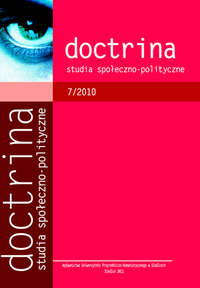Zagadnienie bezpieczeństwa w teorii umowy społecznej Jana Jakuba Rousseau
Abstrakt
The Jean Jacques Rousseau’s concept of the social contract is an original rationalistic model of the functioning of the law-based state. According to the concept every individual volontarily [helps to] create and represents the national structures and fully identifies with their system of law. Rousseau’s concept includes both the psychological and sociological aspects, which, having been integrated with each other, make a structural whole in the national and political dimensions. The author of The Social Contract combined the two most important existential aspects of man-and-citizen, whom Aristoteles named zoon politikon – a combination of individual freedom and obligation to submit to the law. The synthesis of individual freedom and social obligations as a citizen produces social freedom. The originality of such a combination is rooted in the concept of the universal will – the final criterium for a functioning of an individual and a state. What is more important, the universal will is a basic guarrantee of harmony, peace and security.




